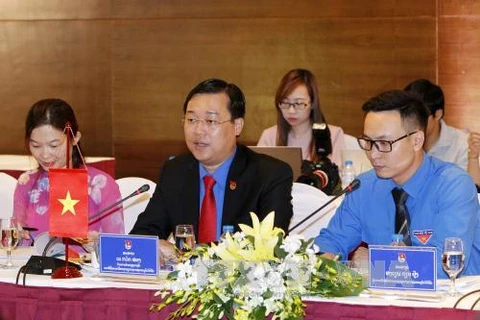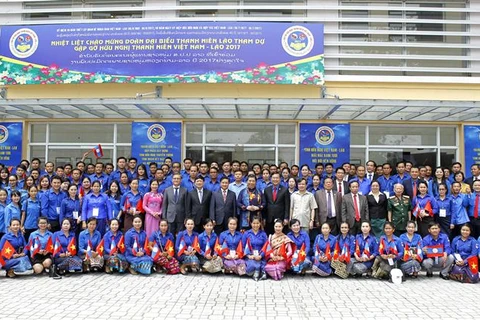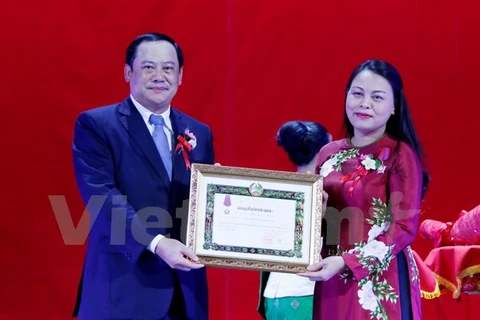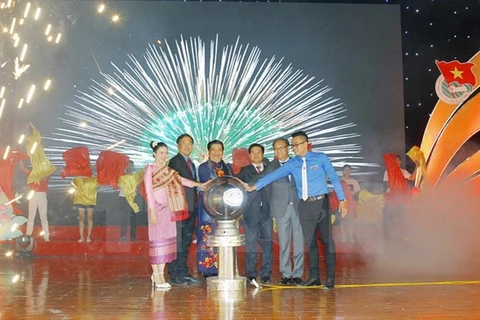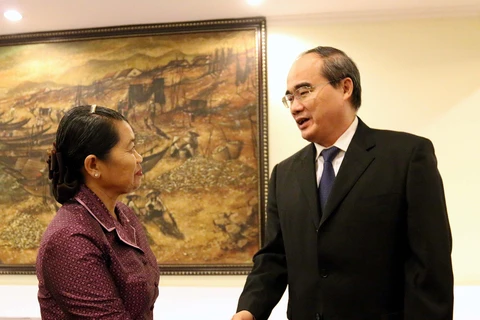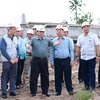Hanoi (VNA) – Prime Minister Nguyen Xuan Phuc stated that Party, State and Government leaders of Vietnam and Laos have always paid special attention to border and territory-related issues between the countries.
He was speaking at a conference reviewing the implementation of a master plan on increasing and upgrading Vietnam-Laos border markers in Hanoi on September 19.
The PM said before the master plan, only one marker was installed every 10km and even 40km of the border line. There are now 1,002 border markers and more than 2,337 poles standing along the borderline, with most of them lying in mountainous areas having rough terrains.
The outcome is of significance as it serves as a foundation to complete a legal dossier for the Vietnam-Laos border line, he said.
“The completion of the master plan is an important event which demonstrates the unity, mutual trust and understanding between the two Parties, States and peoples,” he said.
This work is also a vivid symbol of the special, long-standing friendship, solidarity and comprehensive cooperation between Vietnam and Laos, helping to facilitate exchanges of border residents, consolidate political security, social order and safety, and guarantee national defence and border security, PM Phuc said.
He applauded efforts made by relevant Vietnamese ministries, agencies and ten border localities which have constructively participated in the work, and thanked the Lao Government, ministries, agencies and people for their cooperation and support during the implementation of the master plan.
Talking about potential risks to regional and global security, PM Phuc underscored the need to build and protect the national border on the basis of equality and mutual respect, in line with international law.
To improve the efficiency of border management in the new situation, the leader pointed to the necessity to carry forward outcomes of border marker planting and upgrading, take care of material and spiritual life of border residents, especially ethnic minorities living in difficult circumstances, preserve a border of peace, friendship and cooperation, and ensure security and order, with attention paid to drug crime combat.
Vietnam and Laos should continue their collaboration in realising the protocol on borderline and border markers, and the agreement on land border and border checkpoint management mechanisms, he said.
The PM also called for close coordination between Vietnamese and Lao ministries, agencies and localities in promoting trade, investment and tourism in the border areas.
Efforts should be channeled into developing socio-economic infrastructure, especially in transport, and border gates, he said.
Another important job is to raise public awareness of the significance of the border markers, he added.
Vietnam-Laos borderline stretches as far as nearly 2,337km, through ten Vietnamese and ten Lao provinces. On July 18, 1977, the two countries concluded negotiations and signed the Convention on National Border Demarcation.
Accordingly, from 1978-1987, both sides basically completed border demarcation in the field and settled emerging issues such as the transfer of land, people and assets in line with international law.
From 2008-2016, they partnered to implement the project on increasing and upgrading Vietnam-Laos border markers, with the participation of more than 1,000 personnel. -VNA
He was speaking at a conference reviewing the implementation of a master plan on increasing and upgrading Vietnam-Laos border markers in Hanoi on September 19.
The PM said before the master plan, only one marker was installed every 10km and even 40km of the border line. There are now 1,002 border markers and more than 2,337 poles standing along the borderline, with most of them lying in mountainous areas having rough terrains.
The outcome is of significance as it serves as a foundation to complete a legal dossier for the Vietnam-Laos border line, he said.
“The completion of the master plan is an important event which demonstrates the unity, mutual trust and understanding between the two Parties, States and peoples,” he said.
This work is also a vivid symbol of the special, long-standing friendship, solidarity and comprehensive cooperation between Vietnam and Laos, helping to facilitate exchanges of border residents, consolidate political security, social order and safety, and guarantee national defence and border security, PM Phuc said.
He applauded efforts made by relevant Vietnamese ministries, agencies and ten border localities which have constructively participated in the work, and thanked the Lao Government, ministries, agencies and people for their cooperation and support during the implementation of the master plan.
Talking about potential risks to regional and global security, PM Phuc underscored the need to build and protect the national border on the basis of equality and mutual respect, in line with international law.
To improve the efficiency of border management in the new situation, the leader pointed to the necessity to carry forward outcomes of border marker planting and upgrading, take care of material and spiritual life of border residents, especially ethnic minorities living in difficult circumstances, preserve a border of peace, friendship and cooperation, and ensure security and order, with attention paid to drug crime combat.
Vietnam and Laos should continue their collaboration in realising the protocol on borderline and border markers, and the agreement on land border and border checkpoint management mechanisms, he said.
The PM also called for close coordination between Vietnamese and Lao ministries, agencies and localities in promoting trade, investment and tourism in the border areas.
Efforts should be channeled into developing socio-economic infrastructure, especially in transport, and border gates, he said.
Another important job is to raise public awareness of the significance of the border markers, he added.
Vietnam-Laos borderline stretches as far as nearly 2,337km, through ten Vietnamese and ten Lao provinces. On July 18, 1977, the two countries concluded negotiations and signed the Convention on National Border Demarcation.
Accordingly, from 1978-1987, both sides basically completed border demarcation in the field and settled emerging issues such as the transfer of land, people and assets in line with international law.
From 2008-2016, they partnered to implement the project on increasing and upgrading Vietnam-Laos border markers, with the participation of more than 1,000 personnel. -VNA
VNA

